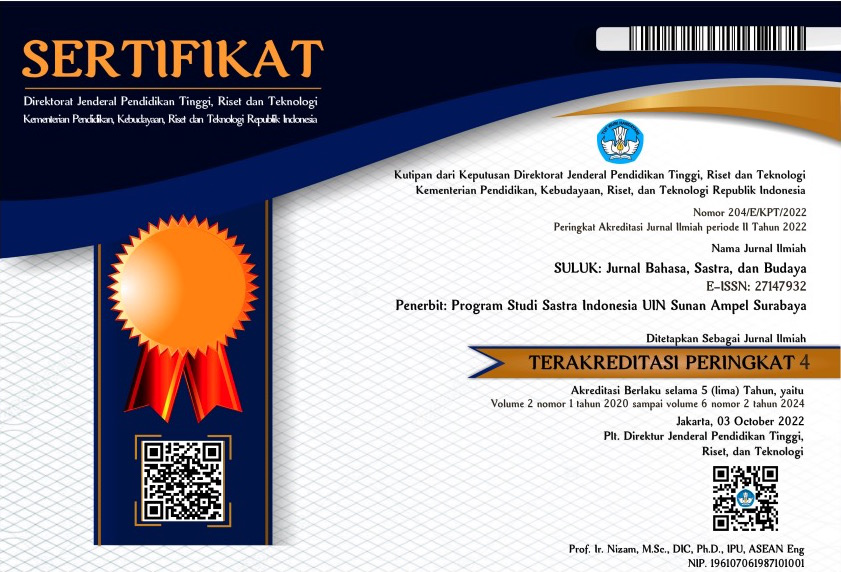Kearifan Lokal Masyarakat Jawa dalam Menghadapi Pandemi
DOI:
https://doi.org/10.15642/suluk.2020.2.2.119-129Keywords:
Local Wisdom, Java Culture, Pandemic, Covid-19Abstract
This research discusses various local wisdoms of the Javanese people in dealing with the COVID-19 Pandemic. Plague which means “pagebluk” in Javanese is responded with cultural attitudes such as understanding the wabah (pandemic) in the framework of titen science, jamasan heirloom as a method, and herbal medicine treatment as a method. This research makes use of Social Anthropology theory. The method used is descriptive qualitative. While the research background is Ngawi Regency, East Java. Data were collected from observations and interviews with several sources and literature study. The results of this study show that each region in Indonesia, especially Java, has its own way of responding to the arrival of the COVID-19 outbreak. With existing local wisdom, the Javanese people are trying to deal with this pandemic in their own way and culture.
Downloads
References
Alisyahbana, S. Takdir. 1977. Perkembangan Sejarah Kebudayaan Indonesia Dilihat dari Jurusan Nilai-nilai. Jakarta: Yayasan Idayu
Andriati, Andriati & Wahjudi, R.M. Teguh. 2016. Tingkat Penerimaan Penggunaan Jamu Sebagai Alternatif Penggunaan Obat Modern Pada Masyarakat Ekonomi Rendah-Menengah dan atas. Masyarakat, Kebudayaan dan Politik, Vol. 29 (3): 133-145.
Clube, S. V. M. 1983. Introduction to Comets. Physics Bulletin, Vol. 34 (6). https://doi.org/10.1088/0031-9112/34/6/029
Gates, B. 2020. Responding to COVID-19--A Once-in-a-Century Pandemic? The New England Journal of Medicine. https://doi.org/10.1056/NEJMp2003762
Hasim, M. 2012. Falsafah Hidup Jawa dalam Naskah Sanguloro. Jurnal Lektur Keagamaan, Vol. 10 (2): 301-320. https://doi.org/10.31291/jlk.v10i2.184
Koentjaraningrat. 1977. Metode-metode Penelitian Masyarakat. Jakarta: PT. Gramedia.
Koordinator, K., & Perekonomian, B. 2011. Roadmap Pengembangan Jamu 2011-2025. Kementerian Koordinator Bidang Perekonomian RI. https://doi.org/10.1016/j.drugpo.2014.08.019
Mujahidin, Akhmad. 2016. Peranan Kearifan Lokal (Local Wisdom) dalam Pengembangan Ekonomi dan Perbankan Syariah di Indonesia. Jurnal Ilmiah Syariah, Vol. 15 (2): 153-168. https://doi.org/10.31958/juris.v15i2.496
Mulyani, Hesti, Widyastuti, Sri Harti, & Ekowati, Venny Ekowati. 2016. Tumbuhan Herbal sebagai Jamu Pengobatan Tradisional Terhadap Penyakit. Jurnal Penelitian Humaniora., Vol. 21 (2): 73-91.
Nasruddin. 2010. Kearifan Lokal dalam Pappaseng Bugis. Sawerigading, Vol. 16 (2): 265-274.
Dewi, Mira dkk. 2012. Pengetahuan Tentang Manfaat Kesehatan Temulawak (Curcuma Xanthorrhiza) Serta Uji Klinis Pengaruhnya pada Sistem Imun Humoral pada Dewa Obes. Jurnal Ilmu Pertanian Indonesia, Vol. 17 (3): 166-171.
Priambadi, Kabul, & Nurcahyo, Aabraham. 2018. Tradisi Jamasan Pusaka Di Desa Baosan Kidul Kabupaten Ponorogo (Kajian Nilai Budaya Dan Sumber Pembelajaran Sejarah). Agastya: Jurnal Sejarah dan Pembelajarannya, Vol. 8 (2): 211-220. https://doi.org/10.25273/ajsp.v8i2.2678
Muntari, Abdul Hadi Wiji. 2008. Takdir Alisyahbana dan Pemikiran Kebudayaan. Jurnal Peradaban, Vol. 1: 1-18.
https://www.scribd.com/document/36885507/1-Takdir-Alisyahbana-Dan-Pemikiran-Kebudayaan
Tohari, Ahmad. 2015. Ronggeng Dukuh Paruk. Jakarta: PT. Gramedia.
Downloads
Published
How to Cite
Issue
Section
License
Copyright (c) 2020 Siti Rumilah, Kholidah Sunni Nafisah, Mochammad Arizamroni, Sholahudin Abinawa Hikam, Sita Arum Damayanti

This work is licensed under a Creative Commons Attribution-ShareAlike 4.0 International License.
- Authors retain copyright and grant the journal right of first publication with the work simultaneously licensed under a Creative Commons Attribution ShareAlike License that allows others to share the work with an acknowledgment of the work's authorship and initial publication in this journal.
- Authors are able to enter into separate, additional contractual arrangements for the non-exclusive distribution of the journal's published version of the work (e.g., post it to an institutional repository or publish it in a book), with an acknowledgment of its initial publication in this journal.
- Authors are permitted and encouraged to post their work online (e.g., in institutional repositories, pre-print sites, or on their website) prior to and during the submission process, as it can lead to productive exchanges, as well as earlier and greater dissemination of published work.








